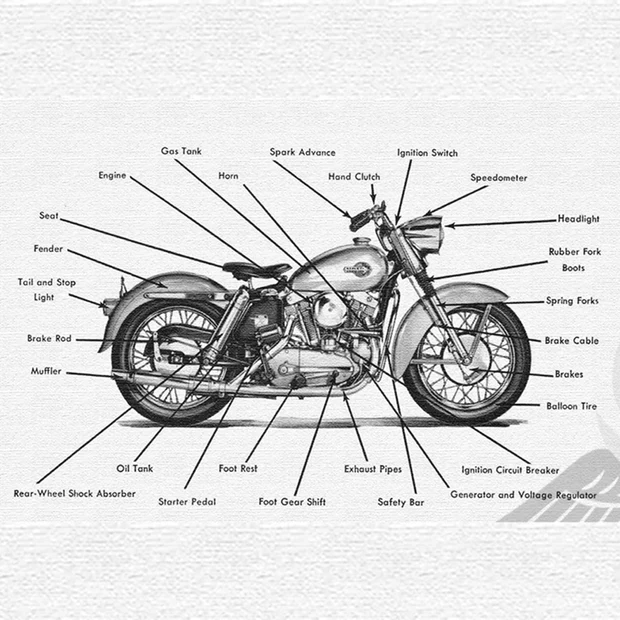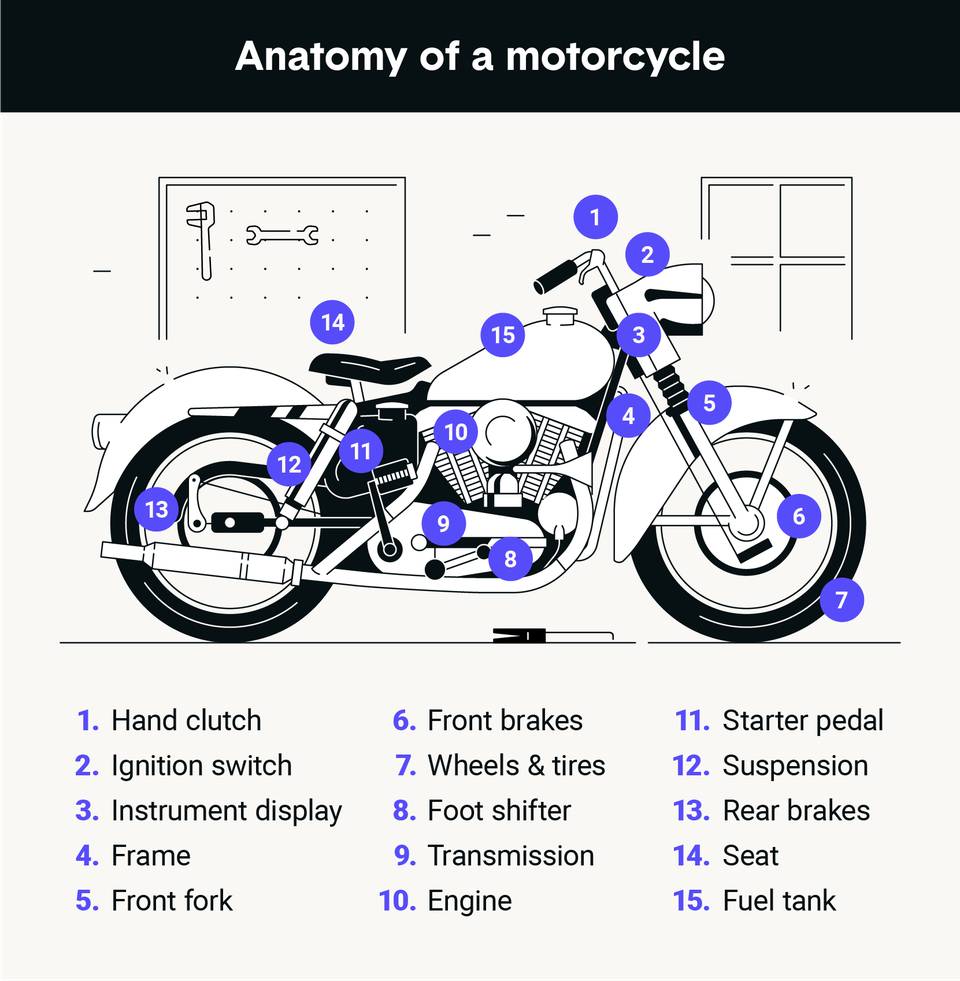Discover the Essential MotorBike Parts You Need for Optimal Performance
Understanding the crucial parts of a bike is basic for attaining peak efficiency. Each component, from the engine to the stopping system, plays an essential role in total capability and security. Routine maintenance can stop unexpected failures and improve the riding experience. Nevertheless, several riders forget the intricacies of these systems. Finding just how they interact can lead to a much more effective adventure. What crucial components should every motorcyclist focus on?
The Engine: The Heart of Your Bike
The engine works as the core part of a motorbike, driving its performance and specifying its capacities. It is in charge of transforming gas right into power, which powers the bike forward. Numerous kinds of engines are utilized, including single-cylinder, V-twin, and inline setups, each offering distinct features fit for various riding functions and designs. The engine size, usually gauged in cubic centimeters (cc), substantially affects efficiency, with larger engines normally supplying even more power and torque.Furthermore, the engine's layout and modern technology, such as fuel injection systems or air-cooling versus liquid-cooling, impact effectiveness and integrity. Maintenance is important for peak operation; elements like normal oil modifications and monitoring ignition system guarantee longevity. Riders often think about an engine's responsiveness and level of smoothness, as these attributes enhance the overall riding experience. Ultimately, the engine stays an important component that defines not just the motorcycle's efficiency but also the motorcyclist's connection to the equipment.
The Transmission: Moving Gears Efficiently
The transmission plays a necessary function in a motorbike's performance, particularly in the mechanics of equipment shifting. Understanding just how to change equipments efficiently can boost the overall riding experience, while normal upkeep guarantees peak capability. Correct focus to these aspects can greatly affect the longevity and effectiveness of the motorbike.

Equipment Shifting Mechanics
Smooth gear shifting is essential for excellent motorcycle efficiency, greatly affecting both acceleration and control. The auto mechanics of equipment changing include the communication between the clutch, gear lever, and transmission system. When a motorcyclist involves the clutch, it disengages the engine from the transmission, permitting a gear modification without harming the elements. A well-timed launch of the clutch, incorporated with specific movement of the gear lever, promotes a smooth modification between equipments. This procedure guarantees that the engine runs within its best power band, enhancing performance. Motorcycle Spares Christchurch. In addition, understanding the gear ratios and their effect on speed and torque can help motorcyclists make notified selections throughout changes, ultimately contributing to an extra pleasurable and receptive riding experience
Upkeep Tips Importance
Regular maintenance plays an important duty in assuring that the transmission system runs efficiently, permitting smooth gear shifts. Regularly changing the transmission and examining liquid is important, as old fluid can result in raised rubbing and wear. Additionally, checking the clutch for wear warranties peak interaction and disengagement, avoiding slippage during equipment modifications. Lubrication of moving components is just as crucial to minimize friction and enhance performance. Motorcycle owners should additionally keep an eye on for leaks and unusual noises, as these can suggest underlying issues. By sticking to these upkeep tips, cyclists can prolong the lifespan of their transmission system, ensuring that equipment shifts continue to be seamless and adding to the general performance of their motorbike.
The Braking System: Ensuring Safety on Every Experience
Braking systems are fundamental elements that directly influence a motorbike's security and efficiency. They are composed of various components, consisting of brake pads, blades, calipers, and hydraulic lines, all functioning with each other to ensure effective deceleration. The kind of stopping system-- normally either disc or drum-- impacts responsiveness and stopping power.Regular maintenance is necessary to support peak efficiency; worn brake pads can result in reduced effectiveness and raised quiting distances. Additionally, the quality of brake fluid need to be kept track of, as it can soak up wetness over time, jeopardizing braking efficiency.Riders need to additionally think about the relevance of anti-lock stopping systems (ABDOMINAL), which stop wheel lockup throughout sudden quits, enhancing general safety. Correctly functioning brakes are not almost stopping; they instill self-confidence in the cyclist, permitting safer navigation with different terrains. Inevitably, a trusted braking system is important for taking pleasure in every trip with satisfaction.
The Suspension: Enhancing Convenience and Control
A well-functioning suspension system substantially adds to a motorbike's general efficiency, complementing the effectiveness of the braking system. The suspension plays a significant function in taking in shocks from unequal surface areas, assuring a smoother ride while preserving tire contact with the roadway. This contact is necessary for both stability and control, enabling riders to navigate edges with self-confidence and precision.Different kinds of shock absorber, such as telescopic forks or mono-shocks, supply varying levels of convenience and handling. Correctly tuned suspension boosts responsiveness, offering the cyclist with a more connected feel to the motorbike. Regular maintenance checks are essential to ascertain the suspension elements, including springtimes and dampers, are working at their ideal. An effective shock absorber not just elevates the riding experience however likewise adds to the durability of various other motorbike components by decreasing damage. Because of this, spending in quality suspension is crucial for any major motorcycle enthusiast.
The Tires: Attaching You to the Road
Tires play an essential duty in a motorcycle's efficiency, functioning as the key web link between the roadway and the rider. Comprehending the various kinds of tires offered can substantially influence managing and safety. In addition, routine maintenance is essential to ensure peak tire efficiency and durability.
Tire Keys In Explained
Exactly how do various tire types affect a motorcycle's efficiency? Tire kinds play a crucial duty in figuring out a motorcycle's handling, hold, and security. Sport tires, created for high efficiency, deal boosted grip and responsiveness on smooth roadways, making them perfect for competing and aggressive riding. On the other hand, visiting tires focus on toughness and convenience, offering a smoother look at this website trip for long-distance traveling. Off-road tires, characterized by their tough tread patterns, succeed in grip on unpaved surfaces, suitable for adventure lovers. In addition, dual-sport tires mix attributes from both on-road and off-road groups, dealing with flexible riding needs. Eventually, picking the right tire type is vital for enhancing efficiency, guaranteeing security, and improving the general riding experience.
Maintenance Tips Offered
While riding on the road, keeping optimal tire problem is crucial for security and performance. On a regular basis inspecting tire pressure is necessary, as under-inflated tires can result in bad handling and enhanced wear. It is recommended to inspect walk depth regularly; worn tires compromise grip and security. On top of that, motorcyclists ought to seek indications of damage, such as splits or lumps, which can show the requirement for substitute. Turning tires periodically assures even put on, improving long life. Moreover, keeping tires clean from debris and staying clear of extreme curbs can extend their life expectancy. Maintaining proper alignment and balance contributes to come to a head efficiency, lessening tension on other bike elements. Adhering to these upkeep pointers will significantly boost the general riding experience.
The Gas System: Fueling Performance and Effectiveness
The fuel system plays an essential duty in taking full advantage of a motorbike's performance and performance, as it ensures the ideal shipment of gas to the engine. It comprises a number of vital components, consisting of the fuel tank, fuel pump, fuel filter, and gas injectors or carburetor. Each part must function properly to guarantee a powerful and smooth ride.The gas storage tank stores fuel and provides it to the engine through the gas pump, which creates the required pressure. A fuel filter avoids impurities from going into the engine, while the injectors or carburetor mix gas with air for combustion.Proper maintenance of the gas system is crucial; a stopped up filter or malfunctioning injector can lead to reduced performance and increased gas usage. By confirming that the gas system operates effectively, motorcyclists can appreciate improved throttle reaction, much better fuel economic situation, and on the whole improved riding experience.
The Electric System: Powering Your Experience
An efficient electric system is important for the general capability and safety and security of a motorbike, as it powers vital components such as the ignition, illumination, and numerous digital systems. This system consists of the battery, which shops power, and the alternator, accountable for producing power while the engine runs. The circuitry harness attaches these parts, making certain trustworthy power distribution.Additionally, integrates shield the system from overloads, while relays assist manage high-current gadgets with low-power signals. A well-maintained electric system boosts efficiency by making sure smooth beginnings and consistent operation of lights and signals, important for motorcyclist presence and safety.Regular checks of the battery's cost and connections are vital for preventing electrical failures. Riders must also inspect wiring for damage, making sure all parts work ideally. Ultimately, a durable electrical system contributes considerably to the total performance and integrity of the motorcycle.
Frequently Asked Concerns
How Often Should I Replace My Motorbike's Battery?
The frequency of bike battery replacement relies this content on usage and maintenance (Bike Parts Wellington). Usually, batteries should be changed every 3 to five years. Regular checks can aid determine when a replacement is required for peak efficiency
What Devices Do I Need for Basic Motorcycle Upkeep?
For basic motorcycle upkeep, one calls for crucial tools such as a socket set, wrenches, screwdrivers, pliers, tire stress scale, and a torque wrench. These devices assist in efficient upkeep and guarantee the bike runs efficiently and safely.
Just How Can I Improve My Motorbike's The rules of aerodynamics?
To enhance motorbike the rules of aerodynamics, one need to think about adjusting fairings, using windshield expansions, optimizing body placement, and minimizing general weight. These modifications help decrease drag, enhancing security and fuel performance throughout adventures.
What Are the Signs of a Failing Electrical System?
Indicators of a falling short electrical system consist of dimming lights, difficulty beginning, irregular instrument analyses, and blown merges. Motorcycle Parts Auckland. Unusual scents or rust around battery terminals may additionally suggest underlying concerns needing instant attention for security you can try here and efficiency

How Do I Choose the Right Oil for My Motorcycle?
When choosing oil for a motorcycle, one should consider the manufacturer's specifications, viscosity ratings, and the kind of riding. Furthermore, artificial versus conventional oil can affect efficiency and engine protection, affecting the choice greatly. The engine size, typically gauged in cubic centimeters (cc), substantially influences performance, with bigger engines typically giving more power and torque.Furthermore, the engine's design and innovation, such as fuel injection systems or air-cooling versus liquid-cooling, affect effectiveness and dependability. A well-functioning suspension system substantially contributes to a motorcycle's overall performance, enhancing the effectiveness of the braking system. The fuel system plays a vital function in taking full advantage of a motorcycle's efficiency and performance, as it assures the ideal distribution of fuel to the engine. A gas filter protects against pollutants from going into the engine, while the injectors or carburetor mix gas with air for combustion.Proper maintenance of the gas system is vital; a stopped up filter or malfunctioning injector can lead to lowered performance and boosted gas consumption. A properly maintained electric system enhances efficiency by making sure smooth begins and regular procedure of signals and lights, crucial for motorcyclist exposure and safety.Regular checks of the battery's charge and links are essential for avoiding electric failings.
Comments on “Customization Tips Using Aftermarket-Compatible Motorbike Components NZ”